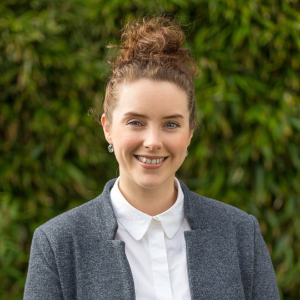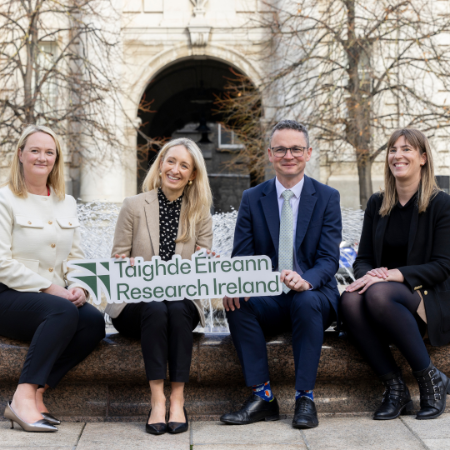Minister for Further and Higher Education, Research, Innovation and Science, Patrick O’Donovan TD, has today announced funding of €26 million for 40 research projects.
Funded under the Taighde Éireann – Research Ireland Frontiers for the Future Programme, the projects address key areas such as environmental sustainability, new EV battery technologies, breast cancer, inflammatory bowel disease, and currently untreatable childhood neurological disorders.
 Congratulations to Dr Dearbhaile Dooley, UCD School of Medicine and Conway Fellow for her project Targeting Inflammatory Signaling between Microglia and Astroglia in spinal cord injury which has received over €777,500 in funding.
Congratulations to Dr Dearbhaile Dooley, UCD School of Medicine and Conway Fellow for her project Targeting Inflammatory Signaling between Microglia and Astroglia in spinal cord injury which has received over €777,500 in funding.
Spinal cord injury (SCI) is a complex medical challenge affecting ~27 million people worldwide. SCI patients lose capabilities of movement and sensation due to damage to electrical nerve cells in their spinal cord. Following the initial mechanical impact, SCI is associated with a diverse inflammatory response, and this involves other nonelectrical cells called ‘glia’. Although largely considered to be detrimental, inflammation can also play a beneficial role in regeneration. This research aims to study glial cells using a variety of new approaches, in order to alter their behaviour and provide a more favourable environment for regeneration/recovery after SCI.
11 UCD projects have been funded:
Dr Rebecca Henry, UCD School of Biomolecular and Biomedical Science: Investigation of the role of the GDF-15/GFRAL signalling axis in mediating neuroprotective effects in the presence of co-morbid diet-induced obesity and TBI
Dr Áine Byrne, UCD School of Mathematics and Statistics: Bridging the gap for mathematical models of gap junctions
Prof Cormac Murphy, UCD School of Biomolecular and Biomedical Science: Mapping the biochemical steps of microbial PFOA metabolism
Associate Prof Niamh O'Sullivan, UCD School of Biomolecular and Biomedical Science: Developing novel therapeutic strategies for neurodegenerative disease
Dr Gary Brennan, UCD School of Biomolecular and Biomedical Science: Long non-coding RNA-mediated cellular dysfunction in acquired and genetic epilepsies
Associate Prof Eoghan McGarrigle, UCD School of Chemistry: BendZymes – Novel Catalysts for Glyco Applications
Associate Prof Vikram Pakrashi, UCD School of Mechanical and Materials Engineering / Dr Michelle Carey, UCD School of Mathematics and Statistics: Energy Harvesting for Monitoring Built Infrastructure : HarMonI
Dr Dearbhaile Dooley, UCD School of Medicine and Conway Fellow: Targeting Inflammatory Signaling between Microglia and Astroglia in spinal cord injury.
Dr Marina Rubini, UCD School of Chemistry: Site-specific chemical modifications of human Interferon-gamma for improved therapeutics
Associate Prof Fiona Freeman, Ad Astra Fellow at UCD School of Mechanical and Materials Engineering and Conway Fellow, and Dr Scheryll Alken, Children's Health Ireland: Conjugated STING-agonist nanoparticles as novel therapeutic add-on to enhance the therapeutic response of chemotherapy for the treatment of osteosarcoma.
Dr Leila Negahdar, UCD School of Chemistry: Programming catalytic surface reactions with dynamic kinetic oscillations
 Welcoming the announcement, Minister O’Donovan said: “I am pleased to announce the Research Ireland Frontiers for the Future projects, which support high-risk, high-reward research endeavours. The selected projects, spanning 12 research institutions, bring fresh and innovative ideas that will help boost business and benefit society.
Welcoming the announcement, Minister O’Donovan said: “I am pleased to announce the Research Ireland Frontiers for the Future projects, which support high-risk, high-reward research endeavours. The selected projects, spanning 12 research institutions, bring fresh and innovative ideas that will help boost business and benefit society.
“I would also like to commend Research Ireland and the Children’s Health Foundation for their great partnership and their focus on advancing children’s health through this funding program. I encourage others to create similar partnerships and collaborations.”
Celine Fitzgerald, Interim Chief Executive Officer, Research Ireland, commented: “The Research Ireland Frontiers for the Future programme helps to build research capacity, expertise and reputation. This latest round of grants will support a diverse range of research positions and represents a strong commitment to developing future talent in key areas. It has been a pleasure having Children’s Health Foundation as a funding partner in that drive to strengthen Ireland’s research pipeline.”
As a Frontiers for the Future partner, Children’s Health Foundation is funding two of the 40 projects (childhood epilepsy and cystic fibrosis) and co-funding another project with Research Ireland (bone cancer).
Fionnuala O’Leary, Chief Executive Officer, Children’s Health Foundation, commented: “Children’s Health Foundation is a proud partner of Frontiers for the Future programme, and we are delighted to co-fund paediatric research projects that will benefit sick children throughout Ireland. Working with Research Ireland, we are able to leverage the funds our incredible supporters raise, to deliver larger grants for research into childhood diseases. This ensures the tireless efforts of our fundraisers can result in kinder and more gentler treatments for sick children. Frontiers for the Future programme plays a key role in enabling us to fund paediatric research with the potential to deliver impact for sick children now and into the future.”
The research will be undertaken in the following research bodies for a period of 2-4 years:
University College Cork
Dublin Institute for Advanced Studies
University of Limerick
University College Dublin
Trinity College Dublin
University of Galway
Technological University Dublin
Dublin City University
Tyndall National Institute
Teagasc
Maynooth University
RCSI University of Medicine and Health Sciences
Congratulations to all those who received funding.
Pictured at the announcement were (left-right): Fionnuala O’Leary, Chief Executive Officer, Children’s Health Foundation (co-funder); Dr Ruth Freeman, Director, Science for Society at Research Ireland; Minister Patrick O'Donovan TD; and Dr Fiona Freeman, UCD, whose research project focuses on treating bone cancer among children, teenagers and young adults.